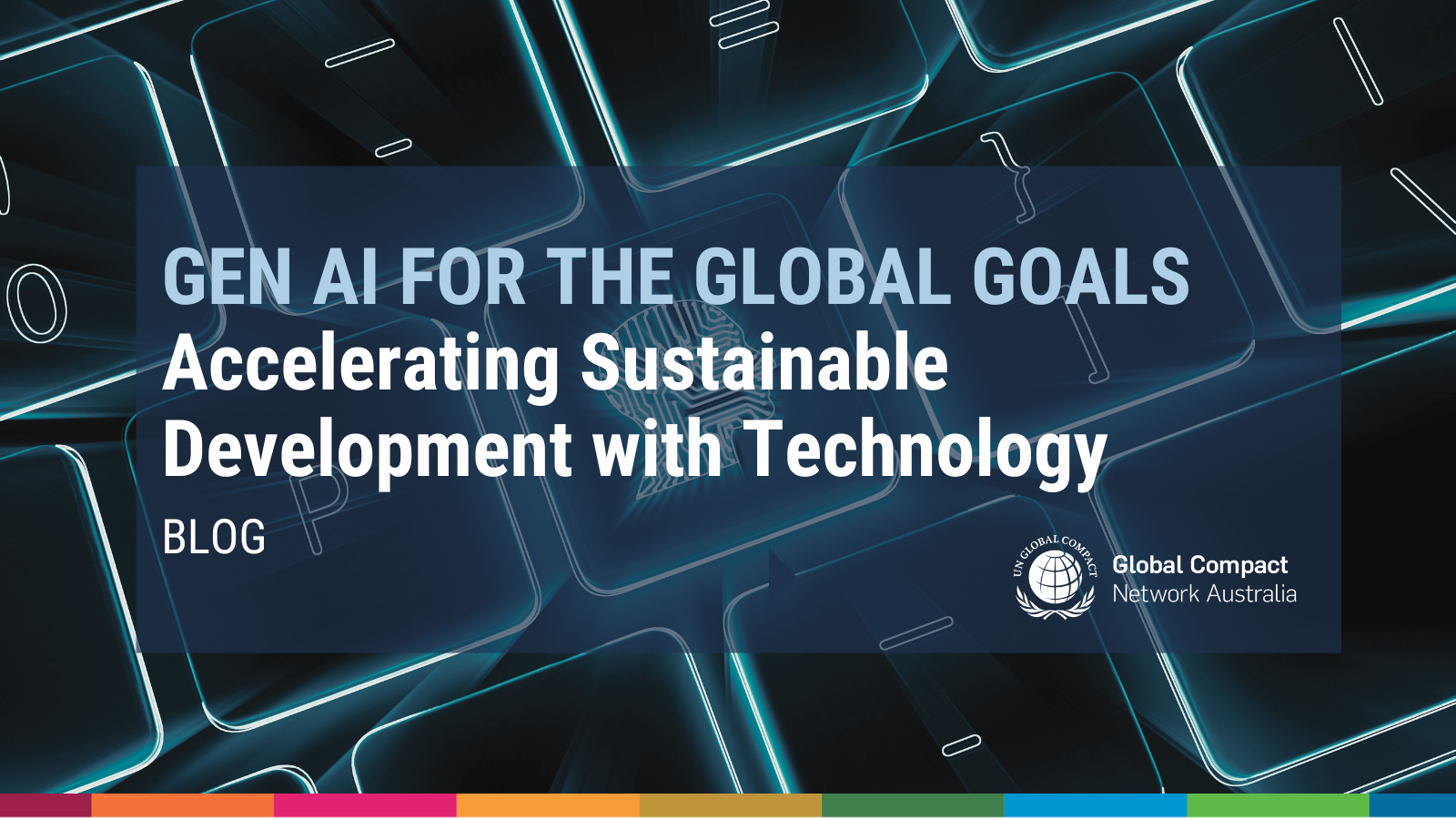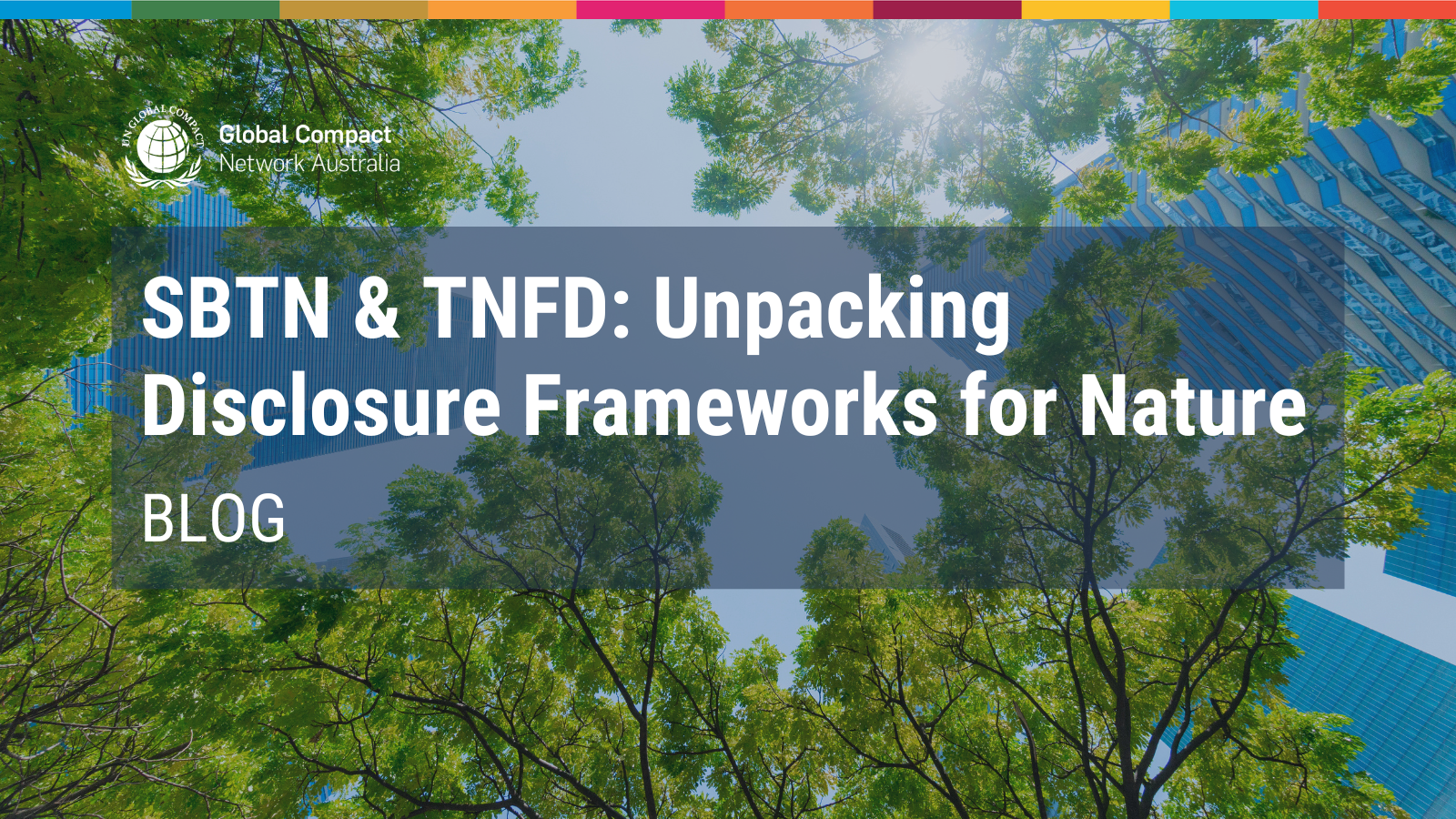
Blogs, Environment & Climate Change, Resources
Gen AI for the Global Goals – Accelerating Sustainable Development with Technology
Dr Evan Center | June 4, 2025
As generative AI (Gen AI) rapidly reshapes the global business landscape, sustainability leaders uncover new opportunities (and responsibilities) at the intersection of Gen AI and environmental, social and governance (ESG) practices. From automating disclosures to enhancing supply chain visibility, the convergence of AI and ESG is no longer a distant concept—it is unfolding now with strategic implications for businesses worldwide. Notably, the United Nations (UN) Global Compact and Accenture recently released a publication on future movements for AI and ESG, titled Gen AI for the Global Goals.
Global Momentum: Gen AI as an ESG Enabler
Gen AI has been described as the “iPhone moment” for artificial intelligence. With the capacity to influence up to 63% of knowledge work—and with 98% of global executives expecting it to impact business strategies within five years—Gen AI’s reach is significant. Already, leading platforms like Salesforce’s Net Zero Cloud and Microsoft’s ESG Copilot are helping organisations automate sustainability reporting, model emissions scenarios, and stay updated on regulatory shifts.
Gen AI for the Global Goals report emphasises that AI tools are being used not only for disclosure automation, but also for analysing Scope 3 emissions, guiding supplier engagement and identifying ESG risks across value chains. These use cases signal a shift in how sustainability is practiced—from reactive compliance to proactive, data-driven decision-making.
Insights from the Australian Context
For Australian businesses, these developments present both opportunities and complexities. Insights from Gen AI for the Global Goals suggest that local enterprises are keen to explore AI’s potential in ESG, but they also recognise the need for inclusive governance, cross-sector collaboration, and digital literacy to ensure responsible implementation.
One recurring theme is the emerging “regulatory gap.” Globally, only 2% of companies had operationalised responsible AI practices by late 2023, a figure that reflects how far governance has yet to catch up with innovation. In Australia, this raises important questions about how businesses, regulators, and civil society can co-create ethical frameworks that reflect both global standards and local values.
Implications for Australian Businesses
To effectively embed Gen AI into sustainability strategies, companies must start by identifying where Gen AI can deliver the most value within their ESG agenda. This includes mapping opportunities in reporting, emissions tracking, or stakeholder communications. As Gen AI for the Global Goals suggests, early alignment between AI capabilities and ESG goals ensures responsible adoption from the outset.
Next, companies must build strong internal governance structures. Responsible AI practices—such as bias mitigation, data transparency, and human oversight—should be implemented before scaling any solution. Despite rapid technological progress, only 2% of companies had operationalised responsible AI by late 2023.
Finally, firms should begin with pilots, such as automating ESG disclosures or analysing Scope 3 supplier data. Solutions like Microsoft’s ESG Copilot and Salesforce’s Net Zero Cloud demonstrate how Gen AI can streamline regulatory compliance by pre-populating disclosures using historical data.
In the natural capital space, impacts, risks and opportunities of Gen AI should be considered early on. As Swaroop Tulsidas, Head of Product at CSIRO, explains, “The work we’re doing with natural capital involves balancing decisions by transparently making trade-offs, requiring us to consider different forms of capital side by side. This approach allows for a fair and deliberate approach to growth and innovation.”
“The expansion of AI is taking a significant toll on nature,” he adds. “For instance, Taiwan’s water stress, which is being exacerbated by semiconductor manufacturing, is just a small part of the environmental cost. The overall impact across the whole supply chain is likely much greater. This doesn’t mean we should halt progress. Instead, we need to define clear use cases for AI that benefit society and enhance human and intellectual capital.”
UN Global Compact Resources
Report | With 2030 fast approaching, innovative solutions are becoming critical to bridge the gap between intent and impact on the Sustainable Development Goals (SDGs). The Gen AI for the Global Goals report, developed by the United Nations Global Compact in collaboration with Accenture, equips private sector leaders with the tools needed to develop and deploy Gen AI responsibly while delivering significant business value. This comprehensive report features actionable strategies, real-world case studies and insights on managing the risks associated with Gen AI. In addition, the report highlights insights from private sector leaders on their Gen AI journey and provides ready-to-use resources to help businesses implement Gen AI responsibly.
Academy course: How will Gen AI change sustainable business? (members only)
1 hr | Foundational Course Discover how Gen AI can accelerate sustainability while addressing critical risks to ensure it benefits all stakeholders. This session explores how harnessing its potential can drive a more sustainable future.
Authors: Johnny Zhang, Environment and Climate Change Intern; Dr. Evan Center, Senior Manager, Environment and Climate Change.



